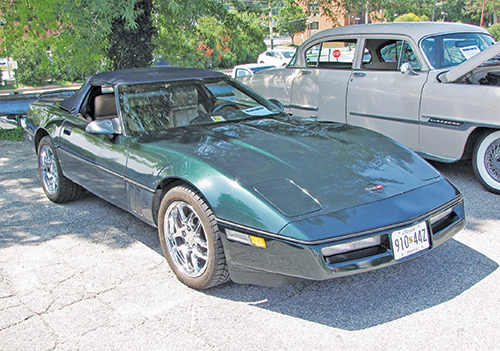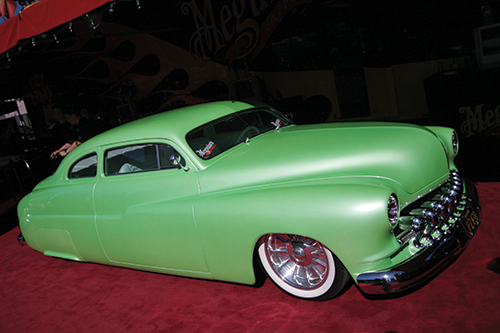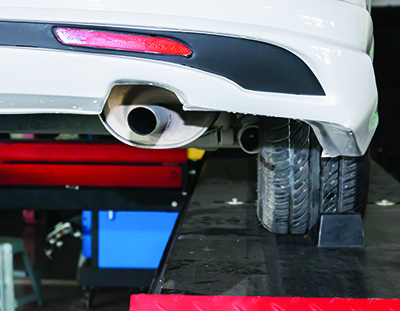◄ Back to Driving Force, Summer 2016
What’s Old Is New
Several States Recycle Past Proposals Impacting Classic Vehicles
While the push to enact a bill into law may be a long road in many cases, don’t lose hope if the outcome is not immediately satisfactory. Just because a bill may have died during a legislative session doesn’t mean that it remains dead forever. In fact, not all new legislative proposals are based on new ideas at all. It is fairly common to see similar bills be reintroduced from a past session. Furthermore, many states allow them to carry-over from one year to the next. Thus, the importance of staying informed through the SEMA Action Network (SAN) and recruiting fellow enthusiasts to get involved cannot be overstated. To follow is an overview of bills aimed at vintage vehicles getting another shot this year:
California Emissions Exemption: Legislation to exempt all motor vehicles prior to the ’81 model year from emissions inspection requirement was reintroduced in the California Senate and approved by the Transportation and Housing Committee. Current law requires the lifetime testing of all ’76 and newer model-year vehicles. The bill will next be considered by the Appropriations Committee. Prior to this session, it was most recently introduced in 2012 but was not approved in the original committee of jurisdiction.
 Iowa Custom Vehicles: A version of SEMA-model legislation to add a vehicle registration classification for custom vehicles was not given full consideration in 2015. However, this legislation is still eligible for consideration in 2016. The bill defines “custom vehicle” as a vehicle with a model year that is at least 25 years old and that was manufactured after 1948, or any vehicle designed and manufactured to resemble a vehicle with a model year that is at least 25 years old and that was manufactured after 1948. The bill also provides that the model year of a custom vehicle would be the same as the model year of the motor vehicle that it is designed to resemble and exempts custom vehicles from periodic vehicle inspections and emissions requirements.
Iowa Custom Vehicles: A version of SEMA-model legislation to add a vehicle registration classification for custom vehicles was not given full consideration in 2015. However, this legislation is still eligible for consideration in 2016. The bill defines “custom vehicle” as a vehicle with a model year that is at least 25 years old and that was manufactured after 1948, or any vehicle designed and manufactured to resemble a vehicle with a model year that is at least 25 years old and that was manufactured after 1948. The bill also provides that the model year of a custom vehicle would be the same as the model year of the motor vehicle that it is designed to resemble and exempts custom vehicles from periodic vehicle inspections and emissions requirements.
Maryland Historic Vehicles: Legislation that originally appeared to subject historic vehicles of model year ’86 and later to undergo periodic safety inspections was approved by the Maryland Senate. An amended version of the bill now specifically excludes historic vehicles from the requirement that they receive an inspection certificate prior to titling and registration. However, the bill would still prohibit the use of historic vehicles for employment, transportation to employment or school and for commercial purposes. The bill also subjects historic vehicles of model-year ’86 and later to equipment repair orders. Having already been approved by the House, the measure will next be sent to the governor for his signature and enactment into law. This topic has appeared in the state repeatedly the last several sessions.
 New Jersey Historic Vehicles: Legislation that would amend the state’s current law governing historic motor vehicles to permit their use for pleasure driving one day per week has been reintroduced in the New Jersey State Assembly. Under current New Jersey law, use of historic vehicles is strictly limited to exhibitions and educational purposes by the owner. This bill was most recently introduced in 2014 but has appeared multiple times in the past.
New Jersey Historic Vehicles: Legislation that would amend the state’s current law governing historic motor vehicles to permit their use for pleasure driving one day per week has been reintroduced in the New Jersey State Assembly. Under current New Jersey law, use of historic vehicles is strictly limited to exhibitions and educational purposes by the owner. This bill was most recently introduced in 2014 but has appeared multiple times in the past.
New Jersey Street Rods and Customs: A version of SEMA-model legislation that would create a vehicle registration classification for street rods and replica custom vehicles and provide for special license plates for these vehicles was reintroduced in the New Jersey Assembly for 2016. The measure defines a street rod as an altered vehicle manufactured before 1948 and a custom as an altered vehicle at least 25 years old and manufactured after 1948. The bill allows kit cars and replica vehicles to be assigned a certificate of title bearing the same model-year designation the body of the vehicle most closely resembles. Prior to this session, it was most recently introduced in 2014 but has appeared multiple times in the past.
 West Virginia Exhaust Noise: Based on SEMA model legislation, a bill that would have allowed West Virginia’s vehicle hobbyists to install and use aftermarket modified exhaust systems that meet a 95-decibel limit was not given committee consideration. The bill failed to be approved by both houses of the legislature prior to the adjournment of the 2016 session. Current West Virginia law only allows a muffler originally installed by the manufacturer or an equivalent. This topic has appeared in the state repeatedly the last several sessions.
West Virginia Exhaust Noise: Based on SEMA model legislation, a bill that would have allowed West Virginia’s vehicle hobbyists to install and use aftermarket modified exhaust systems that meet a 95-decibel limit was not given committee consideration. The bill failed to be approved by both houses of the legislature prior to the adjournment of the 2016 session. Current West Virginia law only allows a muffler originally installed by the manufacturer or an equivalent. This topic has appeared in the state repeatedly the last several sessions.
